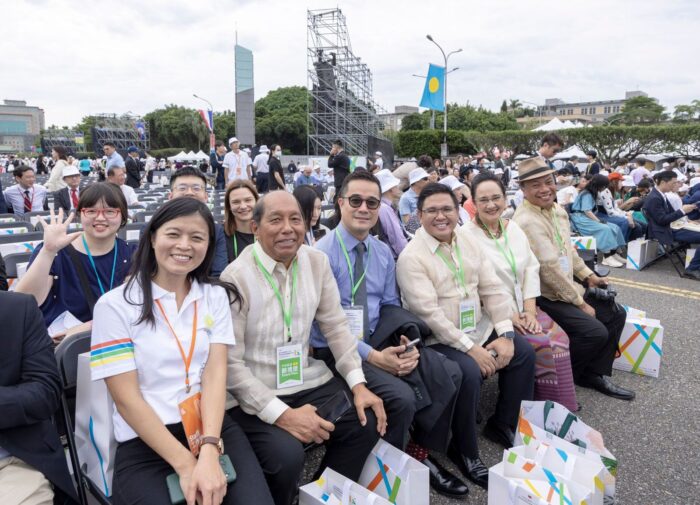
“It was democracy’s finest moment.”
This was how a delegation from the Council of Asian Liberals and Democrats (CALD) described the inauguration ceremonies for Taiwan’s president and vice president last 20 May 2024 in Taipei.
“We bore witness to an exquisite ceremony marking the peaceful transfer of power from one administration to the next”, says CALD Secretary General Francis “Blue” Abaya. “We watched thousands of people cheered on as William Lai and Bi-khim Hsiao took their oath as the next president and vice president of Taiwan. It was a beautiful sight, and it reminds us why we continue to fight for democracy at whatever cost.”
In his inaugural address, President Lai described his and Vice President Hsiao’s journey to Taiwan’s highest posts as a “hard-earned victory for democracy.” He thanked the Taiwanese people for their resolute defense of democracy amidst attempts of external forces to subvert election results.
President Lai described Taiwan’s democracy as a global beacon. He said: “Democracy, peace and prosperity form Taiwan’s national roadmap. And they are also our links to the world. As an important link in the global chain of democracies, a glorious era of Taiwan’s democracy has arrived.”
He then called on the people of Taiwan to defend its existence and way of life: “All of the people of Taiwan must come together to safeguard our nation: all our political parties ought to oppose annexation and protect sovereignty; and no one should entertain the idea of giving up our national sovereignty in exchange for political power.”
While the inaugural ceremonies were the highlight of the CALD delegation’s visit, another important event they attended was the “Countering Authoritarian Influence in Southeast Asia” forum on 21 May which CALD co-organized with the Friedrich Naumann Foundation (FNF) Global Innovation Hub and the Democratic Progressive Party’s (DPP) International Affairs Department.
The speakers in the forum included FNF Southeast and East Asia Regional Director Moritz Kleine-Brockhoff, CALD Founding Member and Former Philippine Secretary (Minister) Florencio “Butch” Abad, CALD Executive Director Celito “Lito” Arlegue, and Taiwan-Asia Exchange Foundation’s Executive Director Alan Yang.
Kleine-Brockhoff provided a regional overview by dividing Southeast Asia’s recent history into two periods: 1998-2005, and 2006 onwards. He observed that during the period 1998-2005, democracy in the subregion was on the rise, reflecting global developments. From 2006 onwards, however, democracy appears to be declining not only in Southeast Asia but also the world.
Abad’s presentation deep dived into the case of the Philippines, arguing that recent political developments in the country can be rooted to its colonial history and the resulting structural inequities it fosters. In particular, he noted how Spanish and American colonization preempted the development of the Filipinos’ sense of nationhood, and raised the specter of political elites by tapping them in colonial administration. As a result, political dynasties persist to this day, and Filipinos seems to be trapped between choosing to perpetuate either the Marcoses or the Dutertes.
The presentation of Arlegue took an organizational approach by looking at the experience of CALD. By looking at its work in Myanmar, Cambodia and Taiwan, he argued that CALD’s unique brand of party-to-party diplomacy in these cases became an alternative route for political engagement when the official/governmental channels were too restrictive. He then enjoined democracy defenders to learn and support each other, to embrace their fear and stand up to bullies, and to prepare for the long haul by taking care of each other.
Yang’s main argument was that China weaponized interdependence against Taiwan by using the so-called “5Ms” – money, media, misinformation-information warfare, mooching (cultivating local compradors), and manipulation. In order for Taiwan to counter these, he proposed the “3Es” – ensuring the diversification of national security, enlightening the population about authoritarian practices, and empowering the youth.
Apart from the forum, the CALD delegation also attended the welcome reception for delegations to the presidential inauguration hosted by the Ministry of Foreign Affairs on 19 May, a tour of prominent liberal thinker Prof. Hai-kuang Yin’s residence on 20 May, a meeting with the DPP Acting Secretary General Andrea Yi-shan Yang, Youth Department Deputy Director Shung-wen Huang, and International Affairs Department Deputy Director Alysa Wen-Li Chiu on 21 May.
Moreover, some members of the delegation paid a courtesy call with Vice President Bi-khim Hsiao on 22 May. The visit provided an opportunity to briefly discuss common security threats between Taiwan and the Philippines, and to reminisce the times when Hsiao served as CALD chairperson and secretary general.
“What Taiwan has become in terms of having a developed economy, open society and engaged citizenry is an inspiration for many of us in Southeast Asia”, says CALD Secretary General Abaya. “So thank you, Taiwan, for reminding us what our countries could look like under a working democratic system.”
|
Categorised in: News Article
This post was written by CALD
 Unit 409, 4/F La Fuerza Plaza 2, 2241 Don Chino Roces Ave. corner Sabio St., 1231 Makati City, Philippines
Unit 409, 4/F La Fuerza Plaza 2, 2241 Don Chino Roces Ave. corner Sabio St., 1231 Makati City, Philippines
 +632 8819 60 71
+632 8819 60 71
 info@cald.org
info@cald.org